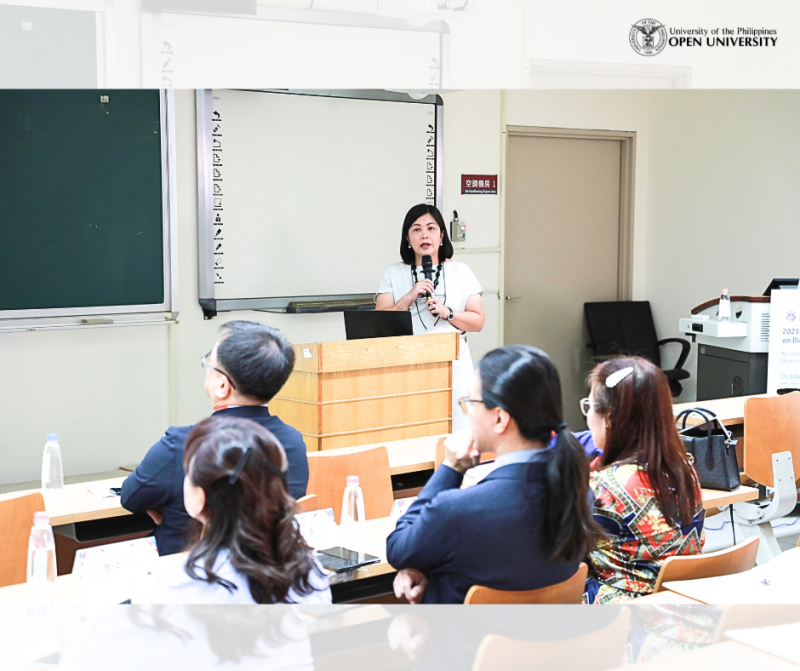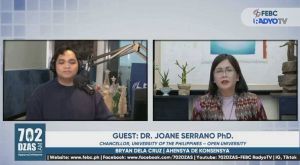Is providing access to education enough? Does it lead to real and lasting impact? These are the questions that UPOU Chancellor, Dr. Joane V. Serrano, raised in her recent presentations in two international academic forums.
She noted that in the early years, open and distance education focused on expanding access so that more people can participate in learning. Today, however, Chancellor Serrano said that the sector has now reached a stage where access must translate into meaningful and sustainable outcomes and impacts.
Preparing students for these challenges can be guided by the International University Social Responsibility (iUSR) — a framework that is based on the belief that universities have a primary responsibility to educate their students to engage with and contribute to the betterment of society.
Universities as Responsible Institutions
In her presentation at the iUSR Forum organized by Kaohsiung Medical University (KMU) in Kaohsiung, Taiwan on 10 October 2025, Dr. Serrano emphasized that even well-intentioned universities are not automatically socially responsible. As she noted, universities can “produce graduates who become professionals and leaders that sustain systems that are unjust or unsustainable.”
“That is why iUSR is necessary,” she explained. “It reminds us that we cannot be complacent. It pushes us to be creative, bold, and innovative in reimagining how we teach, how we research, how we serve, and how we engage with society.”

Chancellor Serrano presents at the iUSR Forum in Kaohsiung, Taiwan.
Learning for Social Good
To illustrate how UPOU integrates social, economic, and environmental transformation into its work, she cited examples like the Project LAKBAY (Learning Actively through Knowledge-Based Appreciation for Youth). What started as a simple cultural exchange has become an immersive activity for Taiwanese students to interact with underprivileged local communities and see these realities from a sustainability lens.
This project demonstrates how iUSR is translated into instruction, research, and public service. Students learned directly from the lived realities of local people and gained insights that could inform both local policy and academic studies. More importantly, their participation did not end with observation as they worked with the community to identify solutions to SDG issues like decent work, sustainable livelihoods, and inclusivity.
Building Pathways for OFWs
The UP VINTA (Ventures International for Transformative Academia) is another example of a project where iUSR is in action. It offers continuing education and skills development tailored for Overseas Filipino Workers (OFWs). Moreover, VINTA aslo generates data and insights that can guide policy for improving migrant-centered initiatives. Through partnerships with other organizations, VINTA provides holistic support systems to Filipinos worldwide.
UPOU recently expanded these collaborations by signing MOUs with Lai Pen Yuan Foundation and iNG Stingless Bee in Taiwan. In partnership with Kaohsiung Medical University (KMU), UPOU has also launched Home 2 Taiwan, an initiative that delivers education and skills improvement to Filipinos who now consider Taiwan their second home.
From Learners to Change Makers
At the International Digital Education Conference 2025 (iDEC2025), held on 28–29 October 2025 at Universiti Sains Malaysia (USM) and online, Chancellor Serrano also emphasized that access to education must help learners apply their knowledge to transform their lives, communities, and the world. She believes that Open and Distance eLearning (ODeL), with its flexible design, can empower learners to become change makers contributing to sustainable development.
To achieve this end, Dr. Serrano cited three requirements:
First, access must come with quality and inclusive learning experiences. As an example, she cited MicroCASA, a project that promotes stackable microcredentials that help learners advance at their own pace while staying relevant in their fields.
Second, education must provide opportunities for applied learning and integrate sustainability in its core functions. Examples include Perma G.A.R.D.E.N., a living laboratory for sustainability; PaMaYanAn, an urban planning studio that partners with local governments; and the Barangay Digital Transformation Hub, which empowers communities through digital access.
Third, technology must be leveraged for empowerment and transformation. She said that AI can support personalized learning and help teachers support struggling students, while extended reality projects under UPOU’s Immersive Open Pedagogies (IOP) program help make learning experiential and collaborative.
Dr. Serrano believes that the future of education depends on how connected innovation is with intention. As she said, “Our task now is to help learners connect knowledge to practice, to bridge the gap between learning online and changing realities offline. That, to me, is the heart of transformation.”
Written by Primo G. Garcia | Edited by Anna Cañas-Llamas | Photo Courtesy of Kaohsiung Medical University









